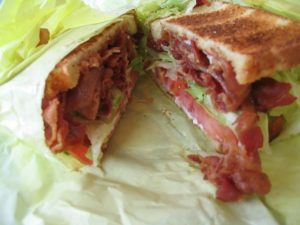To those of you that don’t know already, I have a confession to make. After years of picking holes in and finding flaws in their various ethical or other arguments and of mocking their dietary choices, I’ve become… a vegetarian.

Okay, this probably wasn’t actually a shock to anybody. Between the observations of the barbeque food I’ve been enjoying recently and the fact that I willingly chose falafel over hog roast a month or so ago, it’s quite possible that you’re saying “well, duh” at this so-called revelation. That’s why I thought it’d be far more-interesting for me to talk about the principal reason for this change.
You don’t eat what, now?
For some, however, this change has been a gradual one, beginning with dropping beef from my diet in January, and other red meats in March (making me, technically-speaking, a lacto–ovo–melo–pollo–pescetarian, which is quite a mouthful). Poultry and fish disappeared from my diet in April and May.
For a brief stint, I tried to remove milk, too, aiming for ovo-vegetarianism, but it turns out that – while oatmilk is a perfectly reasonable alternative to the white stuff, and there are some great soya-based dairy-free deserts – there really are no adequate vegan substitutes for cheese… and I’m just not quite capable of coping without it.

Why, Dan? WHY?
My decision to adopt a vegetarian diet is based on a few different influences, but the principal one amongst these is one of environmentalism and sustainability. Over the last few years it’s become increasingly apparent to me that the Western Pattern Diet has a hugely damaging effect in the following areas:
- Water usage sustainability – studies consistently show[1][2] that it takes an order of magnitude more water to produce beef than wheat, rice, or maize, by weight of food produced. Other meats fare somewhat better, being only three or four times less water-efficient per unit of weight of food, but are still unacceptably water-expensive, to me. Milk and eggs are really quite water-efficient, being (respectively) about as efficient as soybeans/rice (depending on the region they’re grown in) and maize (note, of course, that beef and dairy cattle are almost always separate breeds[3], so the counter-argument that beef is a by-product of milk production or vice-versa is not valid).
- Climatic impact – intensive modern livestock farming has an appreciable negative impact on global climate, contributing over a third of the world’s methane[4], probably the most-significant of the greenhouse gases[5].
- Food scarcity – despite worldwide crop yields increasing faster than population growth[6], year on year, food security is becoming a growing issue owing to desertification of equatorial regions, increased uptake of the wasteful Western Pattern Diet, and an increase in the production of biofuels. A still-growing population, the depletion of fish stocks, and a rapid increase by developed nations in biofuel demands as oil supplies dwindle will only aggravate these issues. While a widely-adopted vegetarian/vegan diet would not in itself alleviate these problems (many of which are caused by political and economic constraints), it would help to ensure that it is possible to feed our booming population in the decades to come.
- Overfishing – most of those reasons, of course, are only applicable to the farming of mammals and birds, but it’s hard to deny that there are huge problems with our consumption of fish, too[7]. We’re already reaching the point where the consumption of many species of fish is ethically very dubious, and an increasing number of species are threatened with extinction. To ensure that fish stocks remain available for future generations, we need either extremely restrictive multinational agreements on fishing quotas (unlikely), or dramatic reductions in the demand for fish.
In short, I could probably best be described as an economic environmentalist vegetarian: I’m concerned primarily with making sure that our agricultural practices are sustainable for the benefit of humans, whether currently existing or future. More on that, little doubt, in the Frequently Anticipated Questions, below.
So… how’re you finding it?
Man, I miss bacon.

Giving up beef, it turned out, was reasonably easy. Ditto lamb. But bacon: that’s something I miss. When my co-worker Liz had a bacon, mushroom and cheese jacket potato at an office lunch the other week, I could have almost drowned in my own drool. I find myself envying those vegetarians I know who don’t eat meat because they don’t like it: those guys have it so easy…
Chicken’s been challenging, too, because it’s always been a go-to base ingredient for me, and I’ve had to learn to substitute other sources of protein into my diet. Thankfully, I’ve been in a strong position: many years of cooking for vegetarians, at one point or another, has given me a pretty good understanding of what’s good for what and a decent repertoire of already-vegetarian dishes.
I tried to give up milk and milk products after realising that the ecological impact of milk production – while significantly less than beef, for a variety reasons – is still higher than I’d like. Sadly, it turns out that milk turns up in just about everything, and cheese and cream are remarkably hard to do without. Maybe some day I’ll give that another go.
On the up-side, though, I’ve discovered a reasonable number of things that I didn’t think I liked, that actually I do… or at least, that are perfectly adequate substitutes for meat products.
But man, I miss bacon. Pigs may be clever, but they’re not smart enough to not be delicious.
I also routinely slip up on the likes of isinglass (used in the production of many of my favourite beers), and gelatine (which appears in a surprising number of things), and I try not to kick up a fuss where food is being prepared for several people, of which I’m only one, in a non-compatible way. For example, I tolerate the addition of Worcester sauce (containing anchovies) as an ingredient where a meal is being prepared for several people – it’d be incredibly inconvenient to require a separation of the food at this point during cooking, and I’m happy to compromise a little where the chef’s convenience collides with my ethics.
Frequently Anticipated Questions
In order that I jump the gun and answer you before you ask:
You consume products made using isinglass, gelatine, and occasional small quantities of fish sauce… you’re not a vegetarian at all!
I guess not. But the label’s for my convenience, not yours. I use the word vegetarian because it’s the simplest-common-denominator. If I ask in a restaurant “what have you got that’s vegetarian, or would be but that it contains trace amounts of isinglass, is made using gelatine, has Worcester sauce in, etc.” I’d never get my meal. Plus, the staff would be confused. To take a mathematical model: the set of things that better-vegetarians-than-I eat is completely contained within the set of things that I eat, and the two are very nearly the same, so to call myself a vegetarian is closer to a convenient rounding error than a lie.
Also; that wasn’t a question.
Do you expect to make a significant difference?
No. But, like many moral decisions, this isn’t about making a significant difference but about doing the right thing.
If there’s a riot in your town and an out-of-control crowd begins damaging and looting the shops in the high street, you might be tempted to go out and steal a nice laptop or television yourself, too. Regardless of whether or not you do so, you won’t make a significant difference – Currys will be just as empty in the morning whether you partake of a little ransacking or not. But that doesn’t change the fact that it would be wrong of you to rob them.
On the other hand, over the course of the rest of my life I’m liable, under ideal circumstances, to make a miniscule but measurable net decrease in the demand for meat products, which might, under ideal circumstances, have an impact on meat production, thereby coming some way to achieving my ideals. Moreover, I’d like to think that my dietary choices go some way to making those dietary choices more palatable (hah!) for others, which may influence others to reduce their meat consumption too.
If the aim is to reduce meat consumption, why not simply eat less meat?
Because I can’t trust everybody else to play along.
My gut feeling is that this would work (although I haven’t read any research to either confirm or deny that suspicion): that if we all just cut down our meat consumption so that we were eating meat only once every few weeks, that we’d have a huge impact on sustainability for the future. But I can’t make everybody do this. The best I can do is to do so myself.
However, if I go just a little bit further and stop eating meat altogether, then I also help to “make up” for other people’s meat-heavy diets.
For every animal you don’t eat, I’m going to eat two!
Well, I hope you enjoy it, because you’ll probably not live too long after consuming all the saturated fats of all of the animals I don’t eat.
In any case: I’m not responsible for how you choose to live your life, even if you are threatening to push Comic Book Guy off a railway overpass.
You mentioned that the economic/ecological reasons were the principal cause for your vegetarianism. Are there other reasons, too, like the health and longevity benefits or the cost saving?
Yes. But they’re not the principal reasons.
Incidentally, removing meat from my diet made it far easier for me to lose the second of my three 10kg weight loss goals (as part of my ongoing effort to get down from 110kg to 80kg; I’m currently at about 89kg), because it’s far easier to avoid fats when you’re already avoiding meat.
How does JTA feel, being the only non-vegetarian in the house?
He’s not… so much. These days, Ruth eats a reasonable amount of a select few different varieties of meat, and Paul… well, I’m not sure I can keep up with our favourite pepperoni-eating vegetarian, but I think that right now he’s abstaining from meat entirely, but I’m not sure.
I have a hypothesis that perhaps the world can only tolerate a certain number of vegetarians at once, so as I became one, Ruth had to stop.
What about sustainably-farmed fish/synthetic meat/a survival situation/some other hypothetical situation?
I’m pragmatic, first and foremost, so if somebody wants to demonstrate that a particular farmed fish is environmentally sound, to my satisfaction, then great: it’s back on the menu! I’m not going out of my way to look for any, though, because I was never a big seafood fan to begin with! It’s not a high priority for me to make my life more complicated by coming up with some kind of complex list of what’s okay and what’s not, when the simple rule “no meat” seems to be perfectly workable.
Survival situation: sure, I’d chow down on whatever was available to stay alive. I’m not stupid!
And synthetic meat? If it was economically-sound, environmentally-friendly, safe, and tasty… sounds like a win to me. Fetch me a plate!
Isn’t this quite a turnaround for somebody who was once quoted on the BBC as describing vegetarianism as an “eating disorder”?
Yes, I suppose it is. I’ve always prided myself, though, on what I call “correctness over consistency”: that is, I’d like to think that I’m able to do the right thing, even where it means contradicting my previous attitudes or behaviour. I believe that we’d all do a lot better if people were less attached than they are, on average, to appearing consistent, especially when they’re faced with new information. There’s no shame in saying “I was wrong then,” so long as you can show that you’re learning.
But yes, I’ve been quite mean to many vegetarians for many years, as if I needed reminding. And so yes, this really is quite a turnaround. And I’m proud to be capable of that.
References
- [1] [PDF] Virtual water flows between nations in relation to trade in livestock and livestock products, A.K. Chapagain and A.Y. Hoekstra, 2003
- [2] [PDF] Virtual Water in Food Production and Global Trade Review of Methodological Issues and Preliminary Results, Daniel Zimmer and Daniel Renault, 2003
- [3] [PDF] The Changing Landscape of U.S. Milk Production, Don P. Blayney, 2002
- [4] Livestock’s Long Shadow; environmental issues and options, Food and Agriculture Organisation of the United Nations, 2006
- [5] Methane’s Impacts on Climate Change May Be Twice Previous Estimates, Krishna Ramanujan (NASA), 2005
- [6] Food and Agriculture Organization of the United Nations, 2006
- [7] [PDF] Hundred-year decline of North Atlantic predatory fishes, Villy Christensen et al., 2003



